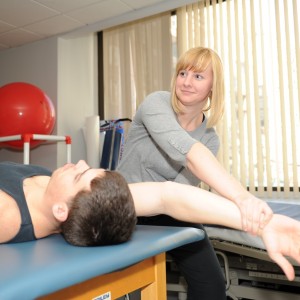Everything you Need to Know About Becoming a Physical Therapist Assistant

WHAT DOES A PHYSICAL THERAPIST ASSISTANT (PTA) DO?
Physical therapist assistants work under licensed physical therapists (PTs) to help people with physical injuries to regain range of movement and control pain. Under the PT's direction, PTAs help people who have lost motor function due to accidents, illness or age.
Physical therapist assistants follow plans created by PTs that involve stretching, strength training, exercises and physical manipulation to help people recover. PTAs keep track of patient progress and collaborate with physical therapists to make clinical decisions. In addition, PTAs educate patients, family members, and other healthcare colleagues to help maximize function through movement.
HOW MUCH DO PHYSICAL THERAPIST ASSISTANTS MAKE?
The Bureau of Labor Statistics reports that the average annual income of physical therapy assistants was $51,110 as of May 2011. This was based on a mean hourly wage of $24.57. The top 10 percent of earners made more than $71,200 a year, while the bottom 10 percent earned less than $32,030. Fifty percent of assistants had annual incomes between $41,320 and $60,250.
WHAT ARE THE EDUCATION REQUIREMENTS?
Many states require that physical therapist assistants have an associate's degree from an accredited program. These programs are broken into practical and classroom sessions. Learn more about our PTA program here.
Licensure is required by most states.
JOB SKILLS AND REQUIREMENTS
- Attention to Detail: Physical therapist assistants need to observe a patient's issues, and accurately report observations to their supervising physical therapist.
- Compassion: People come to physical therapy in pain, and will have concerns and doubts about their recovery. Physical therapist assistants are generally people who want to help those in pain.
- Dexterity: PTAs use their hands to move a patient's body and provide therapeutic exercise.
- Stamina: Physical therapist assistants may have to lift clients, and spend much of their time on their feet. Strength and stamina are needed to do the job.
- Interpersonal Skills: Physical therapist assistants will be working one-on-one with patients every day. They need to like working with people in close situations, be a good communicator and listener.
THE FUTURE OF PHYSICAL THERAPIST ASSISTANTS
The future is bright! Physical therapist assistant jobs are expected to grow by 45% between 2010 and 2020, far exceeding the average job growth.
Ready to begin your journey toward becoming a Physical Therapist Assistant? Request more information today.